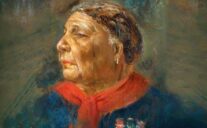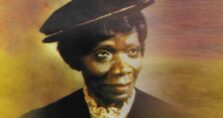To mark Black History Month, we wanted to tell the story of two prominent Black nurses from British history, Mary Seacole and Chief Kofoworola Abeni Pratt. Both faced prejudice but battled through to gain recognition for their work. Their stories are a reminder that Black nurses have been making a significant contribution to the profession since at least the beginning of modern nursing in the late nineteenth century and continue to do so to this day.
 Mary Seacole was an entrepreneur, a nurse, and a mother to many. At the time, her renown matched Florence Nightingale’s. Loved and then lost to history, the remarkable endeavours of Mary Seacole have only in recent years been re-acknowledged in British culture. The brave and ingenious Seacole faced war and epidemics to care for her patients. For her work on the frontline of the Crimean War, she became beloved by the British soldiers and public alike, and so is possibly ‘the first black woman to make her mark on British public life’.
Mary Seacole was an entrepreneur, a nurse, and a mother to many. At the time, her renown matched Florence Nightingale’s. Loved and then lost to history, the remarkable endeavours of Mary Seacole have only in recent years been re-acknowledged in British culture. The brave and ingenious Seacole faced war and epidemics to care for her patients. For her work on the frontline of the Crimean War, she became beloved by the British soldiers and public alike, and so is possibly ‘the first black woman to make her mark on British public life’.
Born in 1805 to James Grant, a white British army officer, and ‘The Doctress’ Mrs Grant, a black Jamaican healer, Mary was raised amidst the British slave trade in Jamaica. Although a free person, Mary and her mother had few civil rights. Nevertheless, her mother was respected in the community as a traditional healer who ran Blundell Hall, a popular boarding house in Kingston. In an amalgamated role of general practitioner, nurse, and herbalist, Mrs Grant taught Mary traditional folk medicine, good hygiene, and her practical knowledge of tropical diseases. She may have also passed on a certain drive, compassion, and business acumen to her daughter. Mary was curious about medicine from childhood. At the tender age of twelve, Mary helped her mother run the hotel and care for the sick or injured soldiers who recuperated there. She travelled multiple times to England as a teenager, learning about modern European medicine while experiencing and defending herself against racism and derision. Over the next few years, Mary’s wanderlust and taste for adventure took her to many countries, before returning to Jamaica to nurse her sick patroness.
As a young woman, she married Edwin Seacole. Her husband was sickly, and Mary nursed him until his death in 1844, which was quickly followed by her mother’s. Her grief devastated her, but Mary threw herself into her work. She was an active entrepreneur and nurse, treating patients of cholera and yellow fever epidemics in Jamaica, Cuba, and Panama.
While running business ventures like a restaurant, she nursed the poor for free. This selfless exposure to disease led her to contract and then recover from cholera. Mary’s skills were recognised, and she was requested to supervise nursing at the British Army headquarters in Kingston. She created the New Blundell Hall to function as both hospital and soldiers’ mess.
With the outbreak of the Crimean War, with soldiers suffering a lack of sufficient medical facilities, Mary asked the British War Office to send her as an army nurse but was rejected. Undeterred, she funded her own passage to Crimea and set up shop by the frontlines. At her own expense, she ran the British Hotel, a restaurant and refuge for the soldiers built from scrap metal and debris.
From baking pastries to administering medicine, Mary did everything she could to bring comfort to those suffering. She loved bright contrasting colours, and conspicuously rode on horseback into the battlefield, nursing wounded men from both sides of the war. In all weather, Mary put herself in the frontlines of the war to help those in need, not only medically but also bolstering morale.
After the war, Mary returned to Britain in poverty and ill health. Her care and hard work did not go unrecognised, however – she was celebrated and loved by many. In 1857, over 80,000 people showed their support for Mother Seacole by attending a fundraising gala for her. Mary then became a best-selling author with the release of her lively autobiography.
Yet, unlike her white peer Florence Nightingale, Mary Seacole’s lifelong nursing efforts were not memorialised in education and were, until recently, largely forgotten.
Mary faced discrimination and rejection as a woman of colour, but her indefatigable kindness and perseverance drove her on. In war and epidemic, Mary offered hope to her patients. She may offer us the same today. She is an example of how we impact others’ lives and what can be achieved by a compassionate person determined to shape her own destiny.
 Chief Kofoworola Abeni Pratt was a pioneer and a leader. Kofoworola was born in 1915 in Lagos, Nigeria, under British colonialism. From childhood, she wanted to become a nurse, but was discouraged by her father, so she became a teacher. She then married Dr Olu Pratt, a Nigerian pharmacist who later studied medicine in London. Kofoworola immigrated to England in 1946 and pursued her dream of nursing.
Chief Kofoworola Abeni Pratt was a pioneer and a leader. Kofoworola was born in 1915 in Lagos, Nigeria, under British colonialism. From childhood, she wanted to become a nurse, but was discouraged by her father, so she became a teacher. She then married Dr Olu Pratt, a Nigerian pharmacist who later studied medicine in London. Kofoworola immigrated to England in 1946 and pursued her dream of nursing.
She was the first black student to study at the Nightingale School at St Thomas’ Hospital, London. Despite experiencing racism, Kofoworola qualified as a state-registered nurse in 1950 and became the first black nurse to work for the NHS.
After a few years of dedicated service to the NHS, Kofoworola returned to Nigeria. After rejection based on her heritage, she persisted to become the first black Matron of University College Hospital, Ibadan. In 1965, she established a nursing school that was instrumental to modern nursing practices in Nigeria. She founded the Professional Association of Trained Nurses in Nigeria and co-founded and edited a nursing journal.
A hardworking and determined woman, Kofoworola went on to become Chief Nursing Officer for Nigeria. She was the first black woman to be vice-president of the International Council of Nurses. She was appointed Commissioner of Health for Lagos and President of Nigeria’s National Council of Women’s Societies. She achieved reforms for doctors, nurses, and public health care.
Her outstanding work has been recognised with a chieftaincy title for services to Nigeria and as an honorary fellow of the Royal College of Nursing, UK. In 1973, she was awarded the Florence Nightingale Medal. Overcoming challenges and prejudice in both the UK and Nigeria, she championed women and was a great nurse and leader.
These two stories originally appeared in the Winter 2021 edition of CMF’s magazine for nurses and midwives, Spotlight.
Annie Peppiatt is a freelance editor who has a special interest in promoting underrepresented voices



